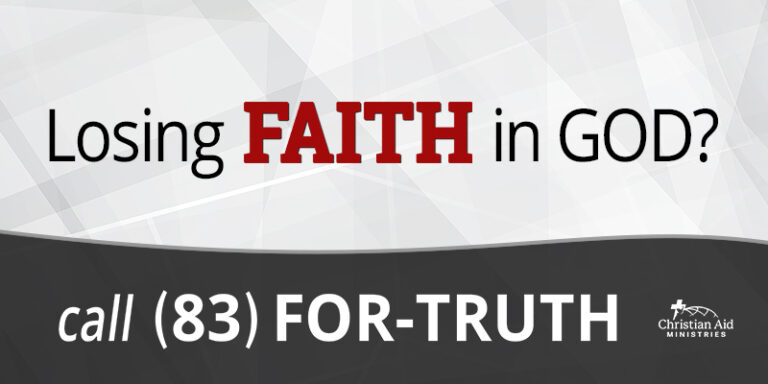Since the beginning of time, people have pondered the question of what the truth really is about a number of subjects. Do convincing answers exist for questions about where we came from, why we are here, and where we are going when we die? If there are such answers, is it possible for us to know them? Or rather, must each of us create our own “realities” by formulating our own opinions about these matters?
Many have responded to these age-old questions by saying that since there are so many opinions, then it simply must not be possible to know the real answers to the questions. But is this true? Or is it actually possible to know what truth is, and to know it beyond a reasonable doubt? I ask you to please consider this question with me as you try to imagine the following scenario.
________________________________
Suppose we would randomly gather together ten people from an average American city and invite them to take part in a discussion about what truth really is. Specifically, we want to know the truth about the major questions of life, such as “Where did we come from?” “Why are we here?” “Where are we going when we die?” and “Is there such a thing as right and wrong?”
To begin the discussion, we ask all ten people to give their individual views on these questions. Not surprisingly, we receive ten completely different answers. Each person has his own worldview which is fundamentally different, in some way, from each of the others. And so we begin to discuss, debate, and argue, hoping somehow to come to a consensus and settle once and for all the question about what truth is.
As the discussion progresses, however, it soon becomes obvious that each person in our group is thoroughly convinced that his version of truth is the right one. Nobody seems willing to consider giving up his opinion about truth in favor of someone else’s. We finally realize that it’s going to be pretty difficult to convince even one person to change his views, let alone all ten. Since coming to a consensus is going to be virtually impossible, we decide that we might as well just give up and go home.
Just before we separate, however, another man approaches our little group, raises his voice, and announces that he can provide us with the answer, once and for all, to the question about what truth is. We turn and look at the stranger skeptically, and explain to him that we have been debating this question all afternoon, but no one has been able to convince the others that his version is the right one. “Can you tell us, Sir,” we ask, “why you think your opinion of truth is so much more convincing than any of ours?”
“You see,” the man replies to us. “I don’t only have an opinion about truth. I will also provide the evidence to prove that what I say is true.”
This comment causes everyone to pause for a moment. It was true that the rest of us only had opinions about what we thought was the truth, but here is a man who claims he not only has an opinion, but actually has evidence to support his version of truth. What kind of evidence could he be talking about?
“Well, sir,” we reply to him, “if you really do have solid evidence for your version of truth, then that would certainly be different from the rest of us. We only had opinions about what we thought was true. But tell us, sir, what is this evidence you are going to give us? It had better be pretty powerful evidence since these issues are some of the most important ones we have ever dealt with. We’re not sure we want to put much faith in your so-called evidence unless it is basically irrefutable.”
“Very well,” replies the stranger. “Here is my evidence. After I tell you what my version of truth is, I’m going to allow you to kill me and bury my body. If I stay in the grave like all of you will when you die, then nothing that I have said is true. If, however, my body comes back to life after three days, then everything I’ve said is true.”
We all stare at him, and then at each other, in utter amazement. This man certainly is sticking his neck out! Never before in the history of mankind has anyone ever proposed such a wager. Or, if they have, we can be certain they have all lost miserably. Now we are sure this man is mentally deranged!
Yet, on the other hand, we reason, what if this man really does hold the key to ultimate truth? We’ll never know for sure unless we take him up on his offer. If this miracle of miracles does not occur, then we can ignore what he said and go on with our lives. But if the evidence he is offering really occurs, then we would have to be utter fools to reject any part of his version of truth.
“All right, sir,” we respond. “We’ll take you up on your offer. So before we kill you, go ahead and tell us what your version of truth is.”
The stranger starts by explaining that there is a God who is the Creator of all things seen and unseen. He says that this God has established rules that we as humans must obey, and that the violation of those rules is called sin. He says further that those who commit sin are the servants of sin, and that ultimately all sin will be destroyed, along with those who serve it, in a lake of fire called Hell. He says that Hell is a place of eternal torment for those who enter it, and that we ought to be willing to do absolutely anything, even if it means maiming our own bodies, to avoid going there.
By this time we as listeners are getting rather uncomfortable with all this talk about sin and eternal punishment. But then we remember that the important question is not whether or not we like what he has to say, but, rather, whether or not it is true. And we won’t know whether it is true until we’ve seen whether this man can provide us with the evidence he has promised. If he stays in the grave after we have killed him, we really don’t have to worry about this place he calls Hell. But if he can substantiate his claims by coming back to life, then what he is saying about the afterlife must be true, whether we like it or not.
The stranger goes on to make some astounding statements about himself. He says that he is the son, the only son, of the Creator of the universe. Furthermore, he says that he himself is the way to God, and that no one can come to God except through him. He even goes so far as to say that he, this man standing in front of us, is one with God!
“Wow!” some of us listeners say, “This man surely has an ego, doesn’t he! Now we know for sure that he is mentally deranged.”
Some of the more cautious among us, however, remind ourselves not to pass judgment too quickly. “This is an ego problem,” we wisely reason, “only if these statements are not true. And we won’t know whether or not they are true until we see whether he comes through on the evidence he has promised us. If he stays dead, then it’s all a bunch of lies. But if he comes back to life like he says he’s going to, then we really have no choice but to accept these fantastic claims he is making as the truth.”
Finally, the time comes for us to put this man, and his version of truth, to the test of the ages. He willingly allows us to put him to death. We bury him in a well-known location and make sure we are all familiar with the spot. We hire well-armed guards to keep an eye on the grave to make sure it is left completely alone. And then we wait.
Three days later we begin to hear reports that the grave had been discovered empty, and that large numbers of people have been seeing this man alive. When questioned, the guards cannot produce a plausible story about what happened to the body they were supposed to be guarding. The evidence becomes more and more convincing that this stranger, who had predicted his own death and resurrection, has somehow done exactly what he said he was going to do. Each of us begins to wrestle individually with the most momentous decision of our lives. We ask ourselves, “Will I accept the evidence, and therefore the truth of the claims this man made about himself? Will I believe the witnesses, and therefore acknowledge his authority over me and respond accordingly? Or will I ignore the evidence and try to come up with my own opinion about who this mysterious stranger really was?”
Two thousand years ago a Man named Jesus of Nazareth made claims very similar to those described above. Understandably, people doubted His claims and asked Him to give them evidence to support them. He responded by predicting His own resurrection from the dead. And the overwhelming conclusion, based on the historical evidence we have available, is that He did indeed rise from the grave.
If you are searching for truth, friend, I urge you to start by seeking an answer to the most significant question of all time: Did Jesus Christ rise from the dead, or didn’t He?
If He did not, then we are left to choose between a huge array of belief systems, religions, and philosophies about life, and we have no clear direction as to which one is really the truth.
But if Jesus did rise from the dead, then the key to truth is wrapped up in this Man who walked among us two thousand years ago. He becomes the ultimate yardstick by which all other so-called truth is measured.
________________________________
If you are a Christian today, what is the best evidence that you can give to your non-Christian friends that the Gospel is true? Although the evidences from creation, from archaeology, and from fulfilled prophecy are all very powerful, nothing can really compare with the evidence God gave us when He raised Jesus from the dead. If you want to “be ready always to give an answer” for the reason of the hope that is in you, then study the historical evidence for Christ’s bodily resurrection. As you share this evidence, and the significance of this evidence, with unbelievers, you will be following the example of the first disciples who throughout the book of Acts “preached through Jesus the resurrection of the dead.”
“And with great power gave the apostles witness of the resurrection of the Lord Jesus” (Acts 4:33).










8 Responses
God is love
Aside from how amusing it is that you portray thinking for yourself and trying to form your own conclusions as denying the evidence, historians agree that Jesus did not rise from the dead. In fact, his resurrection was almost certainly something added on to the myths surrounding him several decades after his death.
The Case for the Resurrection: A First-Century Reporter Investigates the Story of the Cross, By Lee Strobel. If you desire information and knowledge then you must investigate all sources. Blessings as you seek.
God Jesus Christ Heaven Hell the Bible and unfortunately Satan is all true who ever belongs to the Truth Believes in me Jesus Christ Repent for the Kingdom of Heaven is at Hand
Before I even seen that beutiful bill board for some reason God has reached out to me a former doubter with so much undeniable proof that their is no question God Jesus Heaven Hell the Bible and Satan is ???? percent true Repent! Believe!
You are correct
I believed, then I did not, then I asked God for Real Proof. In short order, He provides it to me. I am a Warrior for Christ! Amen
We are Christians traveling through Utah.
We saw the billboard and so decided to see what it was about. We went to Gospel billboards.org and read the explanation about the resurrected Christ praise God that this is out here thank you so much for this ministry. It was such an encouragement to us to read this.
How can we contribute to this ministry?
Blessings